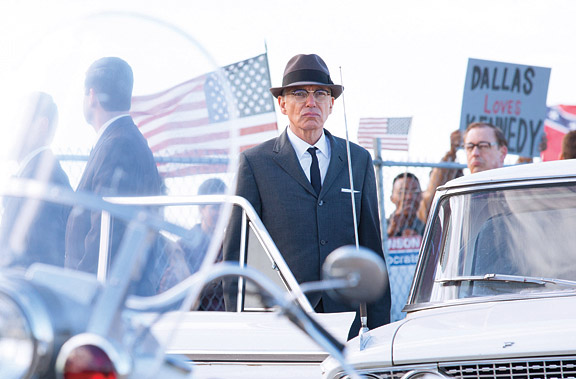Parkland, written and directed by Peter Landesman ’87 (September 20 release).
Fifty years ago, on November 22, 1963, when President John F. Kennedy was brought to Dallas’s Parkland Hospital, “no one was prepared for what unfolded,” says Peter Landesman. “The hospital thought Kennedy was coming in with a cold. The first doctor to greet him was a twenty-six-year-old resident, who was alone with the president for long minutes, as the president bled out on the gurney.”

Landesman had no directing experience or formal training when he took charge of the project last winter, yet he says he felt right at home telling Oscar-honored actors Paul Giamatti, Billy Bob Thornton, and Jacki Weaver what to do. “I know it may sound foolish or maybe arrogant,” he says, “but from the first frame of the movie I felt as if I’d been directing films my whole life.”
In fact, he had spent his career writing fiction and reporting for the New Yorker and the New York Times Magazine, but he had producer Tom Hanks behind him, as well as former Charles Manson prosecutor Vincent Bugliosi on his side. Bugliosi had spent twenty years researching and writing the 1,600-page tome Reclaiming History: The Assassination of President John F. Kennedy. “I’m a highly skilled journalist,” Landesman recalls, “but when I sat down to talk to Vince about this story, it was like I was in second grade all over again.”
Landesman’s road to Hollywood began inauspiciously. At Brown, he was turned down for creative writing classes. “Brown’s creative writing program skewed toward post-modernism, and that was never my thing,” he says. “I like narrative storytelling.” He concentrated in political science and fine arts (he’s also a painter) and taught in Kenya before enrolling in Cornell’s MFA program in creative writing. After completing his first novel, The Raven, he shifted gears to report on conflicts in Kosovo, Rwanda, Pakistan, and Afghanistan. “As a palate cleanser between novels, my agent suggested I cover Kosovo for the New Yorker,” Landesman recalls. “It was like I got bitten by a vampire. I spent the next ten years doing long-form journalism.”
Back in the States, he wrote investigative pieces for the New York Times Magazine, and Hollywood took note. His 2004 report on sex trafficking, “The Girls Next Door,” inspired Kevin Kline’s 2007 movie Trade. But when MGM botched its adaptation of an art forgery story, Landesman says, “I read the screenplay, which was terrible, and thought, ‘Hell, I can try this myself.’”
He caught Tom Hanks’s eye with a script about Watergate FBI Agent Mark “Deep Throat” Felt. Although that script has yet to be produced, Hanks’s Playtone production company asked him to adapt Bugliosi’s Reclaiming History as an HBO miniseries. The network ultimately passed on the project, but Landesman refused to give up. “I realized there’s a ferociously entertaining movie in the material, so I rewrote it as a feature on my own time and my own dime and went to Tom [Hanks] with it.”
With Hanks backing it and Landesman at the helm, the project came together quickly last summer with a cast that includes Zac Efron, Marcia Gay Harden, and Giamatti, who plays amateur moviemaker Abraham Zapruder. Academy Award–winner Thornton portrays Secret Service agent Forrest Sorrels, and Australian actress Weaver costars as assassin Lee Harvey Oswald’s mother, Marguerite Oswald. John F. Kennedy, Lyndon B. Johnson, and Jackie Kennedy are portrayed by relative unknowns.
“Parkland is not about the principals,” Landesman explains. “It’s about everybody else. Their stories that day are more fascinating and in some ways more important because they represent the rest of us. Parkland is about what happened that day to America.”





